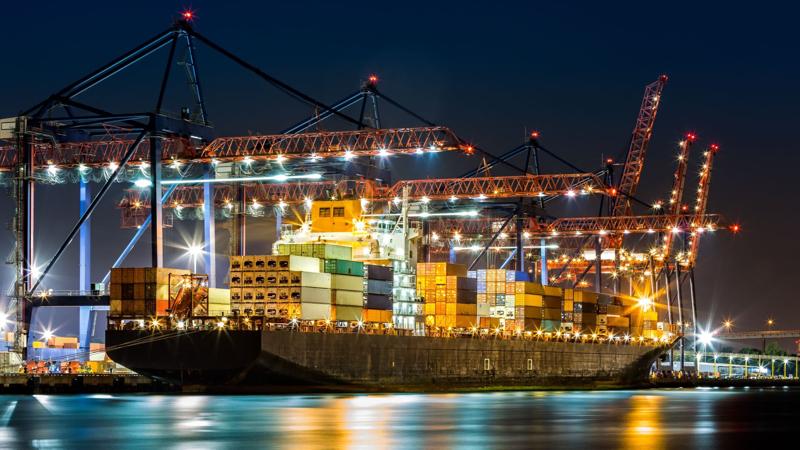When an estimated 45,000 members of the International Longshoreman’s Association went on strike at 36 U.S. ports seeking higher pay and protections against automation, the union boss threatened to cripple the U.S. economy.
A respected leader in supply chain law doesn’t disagree as the strike is now in its second day.
“If you remove the ports from the equation, you have to ask how things will get where they need to be,” said Ronald Leibman, partner for McCarter & English, in an interview with The Center Square. “Some things will get here more slowly, and some of it won’t get here at all, like what we saw with COVID-19; and we can expect wholesale retail prices to go up.”
The strike comes days after Hurricane Helene devastated parts of the Carolinas, Florida, Georgia, Tennessee and Virginia, which have all reported deaths. AccuWeather estimates the storm caused damages and economic losses of $145 billion to $160 billion alone.
Both of these events point to a bigger picture of a slowdown in the United States’ transportation of goods ahead of the holiday season, the peak for shipping.
“I will cripple you, and you have no idea what that means. Nobody does,” Harold Dagget, chief negotiator for the International Longshoremen Association, said in an interview posted to YouTube last week.
Daggett outlined a multi-week dockworkers strike at ports across the East and Gulf coasts.
“When my men hit the streets from Maine to Texas, every single port locked down. You know what’s going to happen? I’ll tell you,” Daggett said. “First week, be all over the news every night, boom, boom. Second week: Guys who sell cars can’t sell cars, because the cars ain’t coming in off the ships. They get laid off. Third week, malls are closing down.
“They can’t get the goods from China. They can’t sell clothes. They can’t do this. Everything in the United States comes on a ship. They go out of business. Construction workers get laid off because the materials aren’t coming in. The steel is not coming in. The lumber is not coming in. They lose their job. Everybody’s hating the longshoremen now because now they realize how important our jobs are.”
The Observatory of Economic Complexity, billed as the world’s leading data visualization tool for international trade data, says top American imports are crude petroleum (value $199 billion), cars ($159 billion), broadcasting equipment ($116 billion), computers ($108 billion), and packaged medicaments ($91.3 billion).
Daggett is leading the negotiations for his workers to receive higher wages and assurances that their jobs will be safe from automation and artificial intelligence in the future.
Leibman said costs go up when the supply chain stalls and products can be more scarce. When looking at this from an import view, the Christmas season is not really the biggest issue, he said.
“I’m not saying it won’t come eventually, but the question really is about regular stocks, like bananas,” Leibman said. “Seventy-five percent of bananas come through the East Coast, so the question now is, where are they going to come in through? If this lasts longer than a week, I think the average person will start to question why bananas are costing them significantly more. I don’t think that rhetoric will play well politically.”
The longshoreman’s union responded to the offer of a 50% increase for union members, stating, “USMX’s recent press release is another attempt to distort the facts and mislead the public. The ILA rejected the ‘nearly 50% wage increase’ because it didn’t address the demands of members adequately.”
USMX is an acronym for the U.S. Maritime Alliance, which represents terminal operators and ocean carriers.
“They might claim a significant increase, but they conveniently omit that many of our members are operating multimillion-dollar container-handling equipment for a mere $20 an hour,” the union says. “In some states, the minimum wage is already $15. Furthermore, our members endure a grueling six-year wage progression before they can even reach the top wage tier, regardless of how many hours they work or the effort they put in.”
States with $15 minimum wage or higher are California ($16), Connecticut ($15.69), Maryland ($15), Massachusetts ($15), New Jersey ($15.13 for large employers), New York ($15), Washington ($16.28), and the District of Columbia ($16.10).
The union says two-thirds of workers are constantly on call.
The White House released a statement on the matter stating, “Collective bargaining is the best way for workers to get the pay and benefits they deserve.” It also urged the sides to come together and talk.
Before boarding Air Force One on Wednesday, President Joe Biden stumbled through a response. According to a White House transcript, he said, “And, look, there’s a – there’s a consortium of mak- – basically six owners that control all the ports from all the way to the East Coast, down around the Gulf. And – and they’ve made – they’ve made incredible profits – over 800% profit since the pandemic, and the owners are making tens of millions of dollars in this.
As previously reported by The Center Square, pay is one of the main reasons for the strike.
Dockworkers can earn more than $100,000 annually because of work rules and overtime requirements, meaning more than half of 3,726 dockworkers at the Port of New York and New Jersey earned more than $150,000 in the fiscal year that ended in 2020, according to the port’s regulator, the Waterfront Commission of New York Harbor.
One in five dockworkers at the port earned more than $250,000 that year, and at least 18 dockworkers brought in more than $450,000 in the same year.
According to the U.S. Census Bureau, the real median household income for all Americans was $74,580 in 2022.
If the Taft-Hartley Act is used, dockworkers must return to work for 90 days. Biden has said that he won’t use the federal law to intervene.






